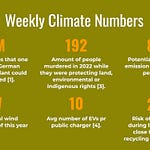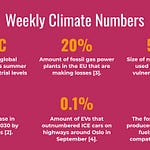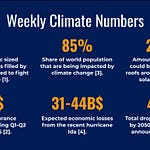Welcome to this week’s edition of The Weekly Climate 🎉
References: [1], [2], [3], [4], [5] and [6].
‼️News you can’t miss
Here’s one important scary/bad (🙀), good (😻), interesting (😼) and fossil (💩) news item.
🙀 76% of California are currently in a drought which does not bode well for the 2021 wildfire “season”.
😻 France is moving closer to banning all national airline travel for which a <2.5h train ride exist
😼 A very detailed post about how high-resolution climate models work.
💩 An incident at a refinery in LA in 2015 almost caused a release of a “terrorist-grade” poisonous gas.
👩⚕️ Status: Climate & Science
Let’s look at how we’re doing this week!
[#drought] — This time last year 27% of California was in drought. Last year was a record setting wildfire season. This year 76% of California is in drought 😬. This doesn’t bode well.
[#climatemodels] — This very detailed post looks at how high-resolution climate models is helping Europe prepare better for extreme weather. Very interesting and nerdy read about climate models.
[#temperature] — The numbers are in. March 2021 was the 8th warmest March ever recorded.
📰 The 7 Grand Challenges
⚡️Decarbonize Electricity
Clean electricity is the one do-or-die challenge we must solve.
[#china] — A new report highlights that China must shutdown 600 coal power plants during the next 10 years in order to hit their 2060 net zero climate target. That’s quite a lot especially when you also consider that 85% of the new coal capacity the past year was built in China.
[#nuclear] — The old environmental orgs have been quick to jump at yet another opportunity to bash nuclear power as Fukushima and the Japanese government has announced that it will release treated water from the failed nuclear power plant into the Pacific ocean. It sure sounds bad, but here’s the thing: All around the world there are limits to how much radioactivity foods can contain and it’s measured in Becquerel / kg. In Europe and US the limits are around 1200 Bq/kg. In Japan, they’re 100 Bq/kg. The radioactivity in the water is 50 Bq/kg. This appears to be a complete non-issue that some environmental groups are getting themselves worked up over. Please convince me otherwise.
[#wind] — A new report looks at the potential for using offshore wind to decarbonize the US electricity sector and concludes that offshore wind can cover 90% of the country’s needed electricity production.
🏘 Reduce impact of urban and rural areas
Lowering the impact of urban and rural areas.
[#paint] — Researchers have created the whitest ever paint. The paint reflects 98% of sunlight and in test has been shown to lower temperature by 4.5C of the surface below ambient temperatures.
[#ambulance] — Soon you can buy an electric ambulance. Companies Lightning eMotors and REV Group have joined forces to build one based on an electric van built by Lightning eMotors that just launched this December.
[#garbage] — This article dives deep into EUs love for incinerators. Some countries such as Denmark like incinerators so much that we’re apparently importing waste from other countries and burning it. Fortunately, politicians seem to have identified the problem so we can only hope that plans will be taken to stop this practice. The challenge is though whether landfills are any better...
🛁 Clean non-electrifiable activities
Some activities we do today can’t be electrified, these must be cleaned some other way.
[#fgas] — A U.S. coalition of industry and environmental groups is pushing the EPA to phase-out the super polluting F-gases faster. They’re basically asking for EPA to provide some regulatory certainty.
[#aviation] — One of the big news this week was France’s decision to introduce a ban on domestic flights for which trains are available. All flights for which there’s a less than 2.5h train journey available will be banned. While some MPs in France voted for the limit to 4h, it is still a start and France looks to take a serious leadership position here. Great job!
🌳 Protect and grow nature
Nature is our ally, we must protect it and help it help us.
[#humans] — Humans have altered or (in the words of this Earther article) destroyed 97% of Earth’s ecosystems. Only 3% of Earths’ ecosystems are untouched by humans.
[#wildfire] — In 2004 forest fires in Alaska burned an area the size of Massachussets. Scientists were expecting these forests to take a long time to grow back and “resequester” the lost carbon dioxide. But a new study published in Science is more hopeful. Because what appears to be the case is that birch and aspen trees are growing back in the burnt areas which grows faster and thus sequester more CO2 than the trees that were burnt in the fire.
[#soil] — As the UN prepares for their soil biodiversity summit this article sums up why soil is one of the most important carbon sinks we have as well as how poorly we (meaning the agricultural sector mainly) is treating it.
[#apple] — Interesting move by Apple who have just launched its 200M$ Restore Fund which together with Conservation International will support forestry projects around the world.
🍽 Optimize food
Without the lower impact of food or drink the hero doesn’t work (modified old danish proverb).
[#soil] — A new study has found that the Corn Belt in the US (an area spanning roughly from Ohio to Nebraska) has lost 1/3 of it’s top soil due to mainly “regular” agricultural practices that are highly damaging to the soil. Eroding soil is not just a problem due to the lost soil carbon, but it costs the agricultural industry an estimated 3 billion dollars every year.
[#lavender] — As drought is repeatedly causing trouble for Indian farmers they are repeatedly switching to non-food crops such as lavender to make a living. Lavender can grow on poor quality soil and require very little water. This article looks into this movement.
[#seaspiracy] — Just in case you’re not done reading about Seaspiracy here’s another critical article about it which has a marine biologist explain what’s wrong with it.
⚖️ Climate Justice
Without justice there’s no future.
[#chemicalweapons] — The horrifying story of a near miss, where an explosion at a refinery in LA caused a risk of releasing a highly deadly chemical. A chemical so deadly that’s it’s on the list of highly controlled substances due to dangerous use in terrorism attacks.
[#solar] — A new report shows that, as expected, dropping rooftop solar costs are making it accessible to lower income households. This is great news for the climate.
⬇️ Engineered drawdown and geoengineering
Protecting our planet and species one way or another
[#carboncapture] — Care must be taken to distinguish carbon capture from carbon removal. Carbon capture is attaching a device to the smokestack of a power plant and capturing “most” of the CO2. Where as carbon removal sucks it from the ambient air. This article deals with carbon capture and it looks at the many many failures of carbon capture projects where carbon capture equipment has been attached to coal power plants and similar. They fail mostly because they’re very difficult if not impossible to monetize. And those that are successful are only monetized because the captured CO2 is used in Enhanced Oil Recovery to pump up even more fossil fuels 😒.
[#carbonremoval] — And here’s a deep dive by Grist on how carbon removal (or direct air capture) really works.
📦 Other / catch-all
All the other stuff that I couldn’t fit into any of the other categories, than the other category.
[#law] — New Zealand becomes the first country to introduce a law that requires financial institutions to disclose the climate risks to their businesses as well as how they will mitigate those risks.
⭐️Special Topics
🎩 Global and local policy
We have a special interest in covering the major global and local policies regarding climate, whether good or bad.
[#eu] — EU has decided to kick the can down the road regarding whether gas and nuclear can be considered a green investment. 🙄
[#fracking] — California’s attempt to ban fracking has died before really getting out the gate due to the lack of Democratic support. Sad...
[#civilianclimatecorps] — This article envisions what the US proposed Civilian Climate Corps (CCC) could look like taking inspiration from the 1940s Civilian Conservation Corps. In this case citizens enrolled in the program would help install solar power plants, retrofitting homes, maintain public transit systems and many more climate related tasks.
[#dirtyeconomy] — A new report by the OECD highlights the dirtiest economies around the world (i.e. CO2 emissions per capita) and urges these countries to change. The top 2 are Iceland and Australia.
[#subsidies] — Bernie Sanders and Ilhan Omar introduces the “End Polluter Welfare Act” (great name btw) that aims to stop all US fossil fuel subsidies. Great move, but I would be surprised if the fossil fuel lobby doesn’t manage to shoot this one down.
[#bigtech] — A new campaign called ClimateVoice is trying to get BigTech to spend 1 in 5 lobbying dollar on lobbying for climate action instead of other stuff. That’s a great idea as long as they don’t stop there.
⛽️Major Carbon Emitters
We have a special interest in covering the moving of the major carbon emitters as these are the key roadblock to climate action.
[#coal] — A new book casts a pretty scathing light over Europe’s coal imports. 41% of EUs coal imports come from Russia where the coal is being mined in poor and marginalized regions of the country where the environmental and human impacts of the practice are horrifying. From winds blowing coal dust into villages coating everything to explosions day and night.
[#lies] — Here’s a new Cambridge research paper arguing that the fossil fuel industry is full of shit when it comes to their decarbonization plans.
[#strandedassets] — Typically, when fossil fuel companies are trying to get rid of assets that are close to being stranded they sell them off with a clean break. Meaning that whoever buys them also have the responsibility to clean them up when they’re done with them. That is now getting tougher and tougher.
[#nft] — If you’re following tech media you will probably have stumbled upon this Non-Fungible-Token (NFT) madness that appears to be taken over the art world right now. In short: Artists can basically turn their artwork into an NFT, which proves that whoever purchases it owns the only copy and will always be able to prove that it’s THE copy. One digital artist calculated that if he were to convert all his art (300 pieces) into NFTs he would have polluted as much as a European does in a decade. That’s insane. So the question, can you do the same in a less polluting way? Yes. It’s a called a certificate of authenticity and is a piece of paper with a signature on it. Trust me, I’m a record collector I have a few of these.
That’s it for this week folks! Remember if you’re feeling down, angry or sad from some of the news in this newsletter one cure is to act. And one way you can always act that also happens to be one of the most powerful things you can do is to talk about it. That also works if what you just read made you hopeful or happy btw.
If you enjoyed this newsletter don’t forget to share it with your friends, coworkers or other people you think could benefit from getting it. If you got directed here by a friend or another link on the Internet don’t forget to subscribe!
See you all next week 👋












